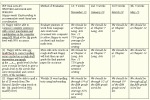In special education an individual education plan, or IEP, is created for a single student’s learning needs whether these needs are challenging or advanced. An IEP creates a modified curriculum for a student. Modification means the curriculum is tailored specifically to this child’s needs. As a result s/he does not follow most of the regular classroom curriculum. That special needs student may learn the same subject at the same time as his or her peers, for instance transformational geometry strand in mathematics, but the IEP student does not learn or get taught curriculum at the provincial or state level. Rather, the student’s curriculum is mo dified to assist the student in improving his or her learning skills, or putting advanced (gifted) skills to better use. An IEP requires the consent of the student’s parent or guardian and cannot be put in place without it. Yearly, the school is required to re-test the child in order to determine whether or not the child needs to continue using an IEP. Watch what is an individual education plan?
dified to assist the student in improving his or her learning skills, or putting advanced (gifted) skills to better use. An IEP requires the consent of the student’s parent or guardian and cannot be put in place without it. Yearly, the school is required to re-test the child in order to determine whether or not the child needs to continue using an IEP. Watch what is an individual education plan?
An IEP is part of the Education Act in Ontario. It is a legality and any student who requires curriculum modification is entitled to an IEP by law. If deemed necessary, the student is also entitled to assistive technology, for example software that translates a student’s speech into text in a word processing program. This type of assistive technology is especially helpful for children with reading difficulties or phonemic dyslexia. Since assistive technology is very expensive a school requires additional funding to provide AT to its special students. In that case the school’s Identification, Placement and Review Committee (IPRC) examines the student’s full academic history, receives feedback from the classroom and special education teacher about the student’s progress, and discusses the situation with the student and/or parents. Watch what are learning disabilities?
All schools are required to establish an IPRC by law. Sometimes consultants from the school board, such as autism specialists, attend the meetings to provide valuable input. Although parents and the student are invited to offer suggestions about the IEP, the IPRC has the right to reject these suggestions if they are deemed unreasonable, unhelpful, irrelevant, or otherwise. In that case the family may appeal an IPRC decision to an Ontario tribunal to determine whether or not the IPRC has made a correct decision. If the tribunal supports the school’s decision the parent is permitted to take the matter further and appeal to the Ontario Supreme Court. Watch best practices and accommodations.
 Along with IEPS, classroom teachers usually provide accommodations for special students. An accommodation does not require parental or administrator consent and is not a legality. An example of an accommodation includes moving a student’s desk beside the teacher’s; not seating an ADHD child near a window since outside activities are distracting for this student; reducing the number of questions a struggling student answers in math compared to the assignment given to the rest of the class and so on. Accommodations are not necessarily used for children with IEPs. They are also used for children with disruptive behaviours and weak academics. Watch learning disabilities accommodations
Along with IEPS, classroom teachers usually provide accommodations for special students. An accommodation does not require parental or administrator consent and is not a legality. An example of an accommodation includes moving a student’s desk beside the teacher’s; not seating an ADHD child near a window since outside activities are distracting for this student; reducing the number of questions a struggling student answers in math compared to the assignment given to the rest of the class and so on. Accommodations are not necessarily used for children with IEPs. They are also used for children with disruptive behaviours and weak academics. Watch learning disabilities accommodations

Comments
This design is wicked! You obviously know how to keep a reader entertained. Between your wit and your videos, I was almost moved to start my own blog well, almostHaHa! Wonderful job. I really enjoyed what you had to say, and more than that, how you presented it. Too cool! cddeabfdkfae
Implementation of IEP can be appealed but does not require parental consent in Ontario ( best practice is to consult with parents but no consent is required), in fact with no parental response to decision to implement an IEP the school must implement it with 30 days of IPRC decision
that is incorrect. In several schoolboards it is a legality.
These are actually wonderful some ideas in the blog. You have touched good quality points here. In whatever way continue writing.
best essay writing service uk